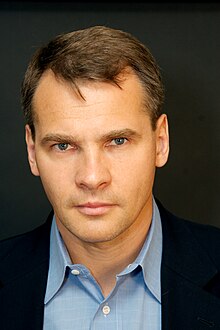Alex Konanykhin
Alexander Pavlovitch Konanykhin ( Russian Александр Павлович Конаны́хин / Alexander Pavlovitch Konanychin ; born September 25, 1966 ) is one of the first bankers in post-Soviet Russia and an American entrepreneur .
Childhood and youth
Konanykhin graduated from School No. 33 in the city of Yaroslavl in 1983 and, like his older brother Yuri before, attended the Faculty of Aerophysics and Space Research at the Moscow Physics and Technology Institute (MFTI). From autumn 1985 he had a part-time job in construction. He set up his own brigade and was commercially successful (by his own account, he earned 22,000 rubles in the first summer).
In 1986 Konanykhin came into conflict with the Soviet and later Russian rulers for the first time . Because of his successful commercial activity (officially "because of the inappropriate distribution of funds") he was expelled from the Communist Youth Association of the Soviet Union in 1986 .
Commercial and political activity in Russia
In 1986 Konanykhin organized the «Schilemstroi» cooperative , for which around 600 people worked in 1991, according to its own information. In 1990 he became one of the first brokers to get a job in the just opened exchange . From 1991 Alex Konanykhin headed the All-Russian Stock Exchange Bank (WBB), through which half of all foreign exchange transactions in the country ran. He financed Boris Yeltsin's election campaign for the Deputates of the Supreme Soviet of the RSFSR . His net worth at the time was estimated at $ 300 million. In 1992, Konanykhin in Budapest was taken hostage by former KGB employees. In 1993 Konanykhin founded the European Union Bank (EUB). According to his own statements, he founded the EUB together with Mikhail Khodorkovsky . The EUB was the subsidiary of "Menatep", whose Vice-President Konanykhin was and in whose management he participated until 1996.
Political asylum in the United States
In 1996, Konanykhin was jailed in the United States on charges made by Russian rulers. In 1997 he was acquitted and released, and in 1999 he was paid $ 100,000 in compensation and granted political asylum .
On November 21, 2003, the US Immigration Appellate Board revoked Konanykhin's political refugee status . The reason was that "there would be no evidence that the Russian government was using criminal proceedings as an instrument of political persecution". Konanykhin appealed. In March 2004 the case against Konanykhin was closed as unlawful. On September 18, 2007, the judge of the Federal Immigration Court in the city of Alexandria, John Briant, stated that if Konanykhin were to be deported to Russia, he would face “mortal danger” because he was “an open opponent of presidents Yeltsin and Putin”.
After 15 years in the United States, including 15 months in prisons and six trials in federal and immigration courts, Konanykhin was granted political asylum in the United States.
In 2009 the thriller The Hunted was released , which is de facto based on the biography of Konanykhin. The book was written by Brian Haig , son of former US Secretary of State Alexander Haig. The novel was dedicated to Konanykhin's wife, Elena, who died shortly before the book was published.
American entrepreneur
One of the first American companies that Konanykhin founded was the American subsidiary of the Moscow advertising agency Greatis.
In 1999 Konanykhin founded KMGI.com , which sells software and new advertising technologies. By 2003 the company had two hundred employees and the office was in the Empire State Building . Business partner of the company KMGI is Konanykhin's wife Silvina, the former vice president of the company Visa in the USA.
In 2011, Konanykhin founded TransparentBusiness and the service of the same name, which deals with the management and control of remote workers . In 2014 the company was a member of a government program that reportedly could create around 100,000 new jobs.
Books
- Defiance: How to Succeed in Business Despite Being Hounded by the FBI, the KGB, the INS, the Department of Homeland Security, the Department of Justice, Interpol, and Mafia Hitmen Renaissance Publishing, 2006. ISBN 978-0972737708
Individual evidence
- ↑ a b c d e http://m.forbes.ru/article.php?id=127821
- ↑ Alexander, Karen, "Did KGB Dupe INS?" Legal Times of July 28, 1997.
- ^ Grigg, William Norman, “Cozy with the KGB,” The New American, Volume 13, Number 20, September 29, 1997.
- ↑ a b c d e http://www.snob.ru/magazine/entry/35182
- ↑ http://www.snob.ru/fp/entry/32739?commentId=315226
- ↑ http://edition.cnn.com/TRANSCRIPTS/0611/24/ywt.01.html
- ↑ "KMGi control software presents the use of work time". PC World. February 23, 2012.
- ↑ http://www.nationaljournal.com/tech/ukraine-wants-to-become-the-silicon-valley-of-europe-20140430
- ↑ http://www.ukrinform.ua/rus/news/posle_smuti_ukraina_moget_stat_liderom_na_mirovom_rinke_it_uslug_1629351
- ^ Defiance: How to Succeed in Business ... - Google Books
- ^ Defiance, or: How to Succeed in Business While Being Targeted by the FBI, the KGB, the Department of Homeland Security, the INS and the Mafia Hit Men
Web links
- Konanykhin's website
- " Kommersant ", November 24, 2003.
- Искусство вовремя уехать: пионер бизнеса . Forbes
- Scott Shane: Federal judge grants Russian banker political asylum . The Baltimore Sun , February 23, 1999.
| personal data | |
|---|---|
| SURNAME | Konanykhin, Alex |
| ALTERNATIVE NAMES | Konanykhin, Alexander Pavlovitch; Конаны́хин, Александр Павлович (Russian) |
| BRIEF DESCRIPTION | Russian banker |
| DATE OF BIRTH | September 25, 1966 |
